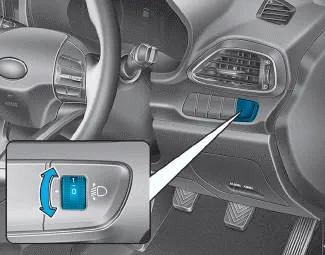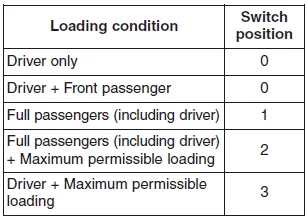Hyundai i30 (PD): Exterior lights / Daytime running light (DRL), Headlamp levelling device
Daytime running light (DRL)
The Daytime Running Lights (DRL) can make it easier for others to see the front of your vehicle during the day, especially after dawn and before sunset.
The DRL system will turn the dedicated lamp OFF when:
1. The headlamps or front fog lights are in the ON position.
2. The position light switch is in the ON position.
3. The engine is turned off.
Headlamp levelling device
Manual type

To adjust the headlamp beam level according to the number of the passengers and loading weight in the luggage area, turn the beam levelling switch.
The higher the number on the switch position, the lower the headlamp beam level. Always keep the headlight beam at the proper levelling position, or headlamps may dazzle other road users.
Listed below are examples of appropriate switch settings for varying loads. For loading conditions other than those listed, adjust the switch position to the most similar situation.

Automatic type
It automatically adjusts the headlamp beam level according to the number of passengers and loading weight in the luggage area.
It also adjusts to the appropriate headlamp beam level for various situations.
WARNING
If the function does not work properly, we recommend that the system be inspected by a HYUNDAI authorised repairer. Do not attempt to inspect or replace the wiring yourself.
Battery saver function The purpose of this feature is to prevent the battery from being discharged. The system automatically turns off the position lamp when the driver turns the engine off and opens the driver-side door.
Whilst driving a corner, for greater visibility and safety, either the left or right side static bending light will turn on automatically. The static bending light will turn on when one of the following conditions occur.
Other information:
Hyundai i30 (PD) 2018-2024 Owner's Manual: In case of an emergency whilst driving
If the engine stalls whilst driving Reduce your speed gradually, keeping a straight line. Move cautiously off the road to a safe place. Turn on your hazard warning flasher. Try to start the engine again. If your vehicle will not start, we recommend that you contact a HYUNDAI authorised repairer.
Hyundai i30 (PD) 2018-2024 Owner's Manual: Notes on the safe use of the Tyre Mobility Kit
Park your car at the side of the road so that you can work with the Tyre Mobility Kit away from moving traffic. To be sure your vehicle will not move, even when you're on fairly level ground, always set your parking brake. Only use the Tyre Mobility Kit for sealing/ inflation passenger car tyres.
Categories
- Manuals Home
- Hyundai i30 Owners Manual
- Exhaust System (DPF) Warning Light. Glow Indicator Light
- Maintenance
- Front fog lamp
- New on site
- Most important about car
